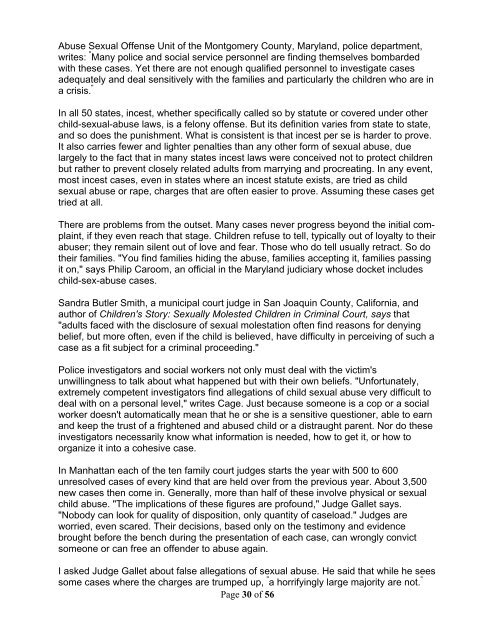Do you want to know what incest is? What it really is? No ...
Do you want to know what incest is? What it really is? No ...
Do you want to know what incest is? What it really is? No ...
You also want an ePaper? Increase the reach of your titles
YUMPU automatically turns print PDFs into web optimized ePapers that Google loves.
Abuse Sexual Offense Un<strong>it</strong> of the Montgomery County, Maryland, police department,<br />
wr<strong>it</strong>es: " Many police and social service personnel are finding themselves bombarded<br />
w<strong>it</strong>h these cases. Yet there are not enough qualified personnel <strong>to</strong> investigate cases<br />
adequately and deal sens<strong>it</strong>ively w<strong>it</strong>h the families and particularly the children who are in<br />
a cr<strong>is</strong><strong>is</strong>. "<br />
In all 50 states, <strong>incest</strong>, whether specifically called so by statute or covered under other<br />
child-sexual-abuse laws, <strong>is</strong> a felony offense. But <strong>it</strong>s defin<strong>it</strong>ion varies from state <strong>to</strong> state,<br />
and so does the pun<strong>is</strong>hment. <strong>What</strong> <strong>is</strong> cons<strong>is</strong>tent <strong>is</strong> that <strong>incest</strong> per se <strong>is</strong> harder <strong>to</strong> prove.<br />
It also carries fewer and lighter penalties than any other form of sexual abuse, due<br />
largely <strong>to</strong> the fact that in many states <strong>incest</strong> laws were conceived not <strong>to</strong> protect children<br />
but rather <strong>to</strong> prevent closely related adults from marrying and procreating. In any event,<br />
most <strong>incest</strong> cases, even in states where an <strong>incest</strong> statute ex<strong>is</strong>ts, are tried as child<br />
sexual abuse or rape, charges that are often easier <strong>to</strong> prove. Assuming these cases get<br />
tried at all.<br />
There are problems from the outset. Many cases never progress beyond the in<strong>it</strong>ial complaint,<br />
if they even reach that stage. Children refuse <strong>to</strong> tell, typically out of loyalty <strong>to</strong> their<br />
abuser; they remain silent out of love and fear. Those who do tell usually retract. So do<br />
their families. "You find families hiding the abuse, families accepting <strong>it</strong>, families passing<br />
<strong>it</strong> on," says Philip Caroom, an official in the Maryland judiciary whose docket includes<br />
child-sex-abuse cases.<br />
Sandra Butler Sm<strong>it</strong>h, a municipal court judge in San Joaquin County, California, and<br />
author of Children's S<strong>to</strong>ry: Sexually Molested Children in Criminal Court, says that<br />
"adults faced w<strong>it</strong>h the d<strong>is</strong>closure of sexual molestation often find reasons for denying<br />
belief, but more often, even if the child <strong>is</strong> believed, have difficulty in perceiving of such a<br />
case as a f<strong>it</strong> subject for a criminal proceeding."<br />
Police investiga<strong>to</strong>rs and social workers not only must deal w<strong>it</strong>h the victim's<br />
unwillingness <strong>to</strong> talk about <strong>what</strong> happened but w<strong>it</strong>h their own beliefs. "Unfortunately,<br />
extremely competent investiga<strong>to</strong>rs find allegations of child sexual abuse very difficult <strong>to</strong><br />
deal w<strong>it</strong>h on a personal level," wr<strong>it</strong>es Cage. Just because someone <strong>is</strong> a cop or a social<br />
worker doesn't au<strong>to</strong>matically mean that he or she <strong>is</strong> a sens<strong>it</strong>ive questioner, able <strong>to</strong> earn<br />
and keep the trust of a frightened and abused child or a d<strong>is</strong>traught parent. <strong>No</strong>r do these<br />
investiga<strong>to</strong>rs necessarily <strong>know</strong> <strong>what</strong> information <strong>is</strong> needed, how <strong>to</strong> get <strong>it</strong>, or how <strong>to</strong><br />
organize <strong>it</strong> in<strong>to</strong> a cohesive case.<br />
In Manhattan each of the ten family court judges starts the year w<strong>it</strong>h 500 <strong>to</strong> 600<br />
unresolved cases of every kind that are held over from the previous year. About 3,500<br />
new cases then come in. Generally, more than half of these involve physical or sexual<br />
child abuse. "The implications of these figures are profound," Judge Gallet says.<br />
"<strong>No</strong>body can look for qual<strong>it</strong>y of d<strong>is</strong>pos<strong>it</strong>ion, only quant<strong>it</strong>y of caseload." Judges are<br />
worried, even scared. Their dec<strong>is</strong>ions, based only on the testimony and evidence<br />
brought before the bench during the presentation of each case, can wrongly convict<br />
someone or can free an offender <strong>to</strong> abuse again.<br />
I asked Judge Gallet about false allegations of sexual abuse. He said that while he sees<br />
some cases where the charges are trumped up, " a horrifyingly large major<strong>it</strong>y are not. "<br />
Page 30 of 56


